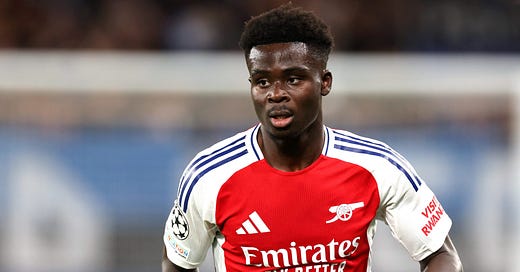Where do you draw your red lines?
UEFA Champions League semi-final poses some awkward questions for football fans
Earlier this year, the DR Congo’s foreign minister - Thérèse Kayikwamba Wagner - wrote to the owners of European football clubs Arsenal, Bayern Munich and Paris Saint Germain.
Each of the clubs is sponsored by the Visit Rwanda tourism campaign, in what some have labelled as being ‘blood stained’ deals.
Kayikwamba Wagner wanted the clubs to terminate their deals with the African country.
So far this year, it is estimated that hundreds of thousands of people in Congo DR have been displaced by the M23, a group widely believed to be under the de facto control of Rwanda’s government.
Rwanda continues to be accused of sports washing, whilst some fans of the European clubs involved have protested about their clubs’ associations with the country.
With Paris Saint Germain and Arsenal now set to face each other in a UEFA Champions League semi-final, the geopolitical and moral concerns surrounding their Rwandan associations look set to be amplified again.
At Arsenal, a fan petition was previously started calling for the club to end its relationship with the Visit Rwanda campaign.
Yet one of the London club’s other sponsors - Dubai’s state owned Emirates Airline - has received rather less scrutiny from fans, the media, and others during their near twenty-year relationship.
The Gulf nation currently finds itself accused by Sudan of being “complicit in the genocide" that has taken place during its ongoing civil war.
Indeed, the International Court of Justice is now hearing a case brought by Sudan against the UAE, following the deaths of more than 150,000 people.
Some protests about this have taken place outside Arsenal’s stadium prior to matches, though fewer people seem aware of the criticisms facing Dubai compared to the more public concerns that are often expressed about Rwanda.
In the same week that Champions League semi-finals take place, Emirates Airline sponsored English FA Cup semi-finals also took place.
Sponsorship deals and commercial partnerships in sport have rapidly moved on from burger businesses and beverage brands (which in themselves raise moral moral and ideological issues), heading instead into more contested, sensitive and complex territory.
Fans who are concerned about this may choose to take direct action, as has been the case with Visit Rwanda.
However, the way in which issues are framed, communicated, and received by fans means that some of them may find themselves compromised (protesting one issue but other another) or else facing difficult choices.
This does not imply moral equivalence, though it does raise issues of awareness and consistency in decision making.
It also increasingly necessitates where fans draw their red lines in a complicated world of sport.




